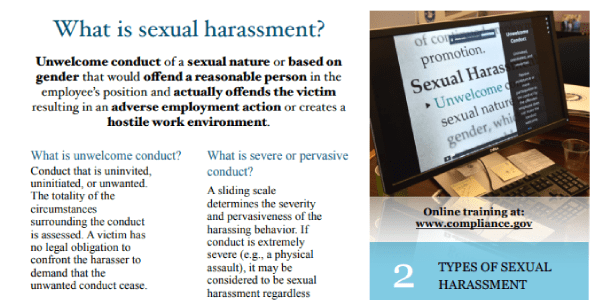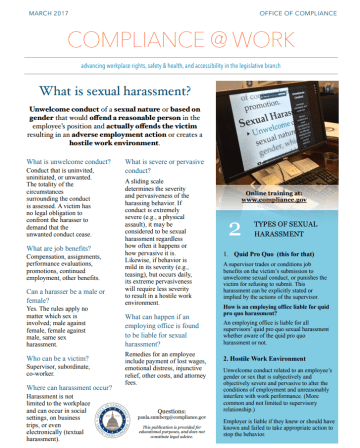What is sexual harassment?
Unwelcome conduct of a sexual nature or based on gender that would offend a reasonable person in the employee’s position and actually offends the victim resulting in an adverse employment action or creates a hostile work environment.
What is unwelcome conduct?
Conduct that is uninvited, uninitiated, or unwanted. The totality of the circumstances surrounding the conduct is assessed. A victim has no legal obligation to confront the harasser to demand that the unwanted conduct cease.
What are job benefits?
Compensation, assignments, performance evaluations, promotions, continued employment, other benefits.
Can a harasser be a male or female?
Yes. The rules apply no matter which sex is involved; male against female, female against male, same sex harassment.
Who can be a victim?
Supervisor, subordinate, co-worker.
Where can harassment occur?
Harassment is not limited to the workplace and can occur in social settings, on business trips, or even electronically (textual harassment).
What is severe or pervasive conduct?
A sliding scale determines the severity and pervasiveness of the harassing behavior. If conduct is extremely severe (e.g., a physical assault), it may be considered to be sexual harassment regardless how often it happens or how pervasive it is. Likewise, if behavior is mild in its severity (e.g., teasing), but occurs daily, its extreme pervasiveness will require less severity to result in a hostile work environment.
What can happen if an employing office is found to be liable for sexual harassment?
Remedies for an employee include payment of lost wages, emotional distress, injunctive relief, other costs, and attorney fees.
TYPES OF SEXUAL HARASSMENT
- Quid Pro Quo (this for that)
A supervisor trades or conditions job benefits on the victim’s submission to unwelcome sexual conduct, or punishes the victim for refusing to submit. This harassment can be explicitly stated or implied by the actions of the supervisor.
How is an employing office liable for quid pro quo harassment?
An employing office is liable for all supervisors’ quid pro quo sexual harassment whether aware of the quid pro quo harassment or not. - Hostile Work Environment
Unwelcome conduct related to an employee’s gender or sex that is subjectively and objectively severe and pervasive to alter the conditions of employment and unreasonably interfere with work performance. (More common and not limited to supervisory relationship.)
Employer is liable if they knew or should have known and failed to take appropriate action to stop the behavior/

